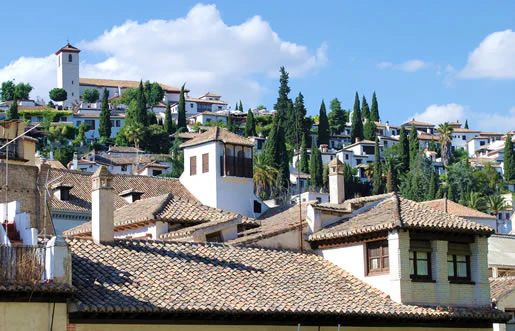Queen's Dressing Room
The Queen's Dressing Room (Peinador de la Reina), also known as Boudoir (Tocador) or Mirador, was built around the year 1537 at the top of Abu l-Hayyay's Tower (Torre de Abu l-Hayyay) and it is so called because the Empress Isabel, Charles V's wife, lived there. On the tower's southern side there is a semicircular arch that leads to the Dressing Room, which was before an Arab lantern. On the rest of its sides there is a corridor open to the landscape. To the right of the entrance there is a sort of burner, formed by a marble flagstone with holes through which the perfume came out. The perfume was produced by spices that were burnt in a chimney downstairs and for this reason this tower was also called the «Tower of the Stove» (Torre de la Estufa). The fresco paintings are of interest, especially the ones representing Charles V's campaign to Tunisia in 1535. These show the squadron's departure from the port of Gagiliari, the journey, the manoeuvres, the withdrawal of the troops and their return to Sicily. Other paintings represent various scenes, from allegories of the Virtues to Phaeton's fable. They were probably made between 1539 and 1546.
Abu l-Hayyay's Tower (Torre de Abu l-Hayyay) was built on the walk by the ramparts and it has a view over the whole valley of the river Darro. The tower was decorated by Yusuf I and finished by Mohammed V. It was part of the palace and had a defensive character. It was accessible from the covered walk by the ramparts underneath the Hall of the Ambassadors (Salón de los Embajadores). The wall used to reach the windowsill of the Dressing Room's balconies, but when it was destroyed in 1831, it was rebuilt to a lower height and a secret staircase was discovered. These stairs go through the lower part of the tower and lead to a clearing in the woods at the base of the tower.
The entrance to the tower has a carved wooden lintel, plaster voussiors above and a rectangle with stars in relief. Unfortunately, the inscriptions that existed around the door are not all preserved, but at least it is known (thanks to the fragments that remain) that they were praises to God and Mohammed V.
Read more about...



